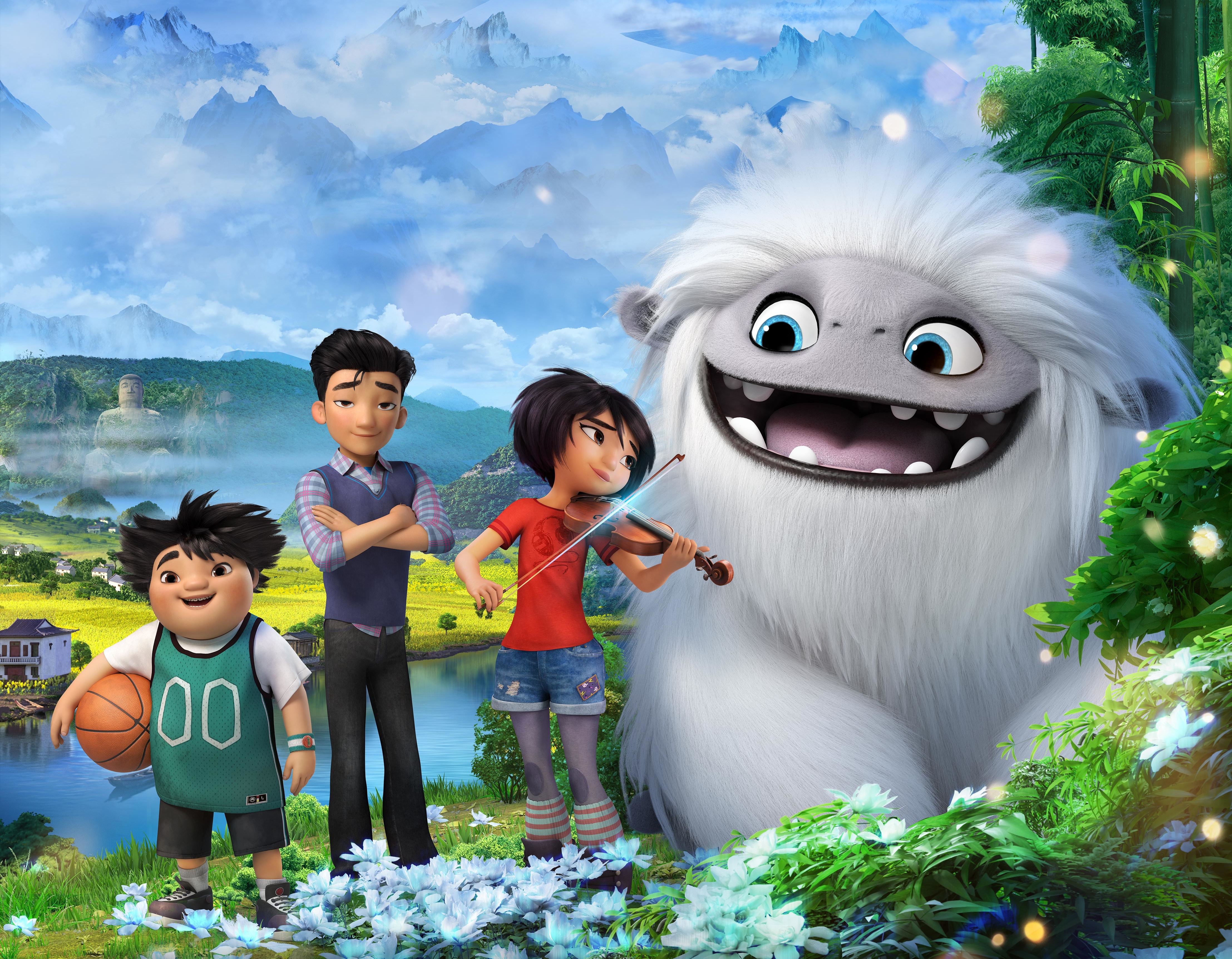Have you ever come across a book that just made you feel, well, a little bit disgusted or perhaps even angry? You know, the kind of book that leaves a lasting impression, not always in a good way. That feeling, that strong reaction, it’s actually quite a powerful thing when we talk about stories and the written word.
It's interesting, isn't it, how certain books can really stir up such intense emotions? We often hear about books that are beloved, or those that spark joy, but what about the ones that trigger something much different? The word "abominable" itself carries a lot of weight, a really strong sense of something unwelcome.
My text explains that "abominable" means "worthy of or causing disgust or hatred." So, when we consider an "abominable book," we're talking about literature that truly hits hard in a negative sense. It's quite a contrast, too, when you think about the animated adventure film, "Abominable," which is a story of helping a yeti return home, full of warmth and friendship, very much unlike the definition of the word itself. So, what makes a book truly abominable? Let's take a closer look, shall we?
- Baddie Captions
- Romanian Boy Names
- Womens Light Pink Cheerleader Flats
- Brown Hair Color With Highlights
- Skirt Trousers
Table of Contents
- What Does "Abominable" Truly Mean for a Book?
- The Core Idea: Disgust and Hatred
- Beyond the Surface: Why a Book Might Feel Abominable
- The Film "Abominable": A Different Kind of "Abominable"
- A Story of Adventure, Not Disgust
- The Word's Broader Use
- When Books Provoke Strong Feelings: Discussions and Considerations
- Content That Can Provoke Strong Feelings
- The Reader's Perspective
- How We Talk About "Abominable" Books
- Critical Conversations
- The Importance of Context
- Frequently Asked Questions About "Abominable" Books
What Does "Abominable" Truly Mean for a Book?
When we use the term "abominable book," we are, in a way, applying a very specific and rather strong judgment. The word "abominable," as my text points out, means something that is "worthy of or causing disgust or hatred." So, a book described this way isn't just bad or boring; it's something that can genuinely upset or offend a reader. It's a pretty intense description, you know?
The Core Idea: Disgust and Hatred
Think about it: for a book to be truly "abominable," its content must evoke a really powerful negative reaction. This isn't about a story you just don't like or a plot that falls flat. No, this is about material that makes you feel a deep sense of revulsion or even hostility. It could be themes, ideas, or even specific scenes that are just, very, very hard to stomach. It's a feeling that goes beyond mere dislike, really.
For some, this might mean a book that promotes hateful ideologies. For others, it could be content that depicts violence or cruelty in a way that feels truly sickening. The core is that the book causes a profound sense of unease or moral outrage. It’s about challenging what a reader considers acceptable, sometimes in a way that feels quite deliberate.
- Toddler Running Png
- World Razer Eaglemoss
- Wallpaper Of Shadow
- 20 Something Lyrics
- Waves Front View Picture Hair Men
Beyond the Surface: Why a Book Might Feel Abominable
The reasons a book might be seen as abominable are actually quite varied. It's not always about obvious gore or shocking language, though those can certainly play a part. Sometimes, it's the underlying message, or the way certain characters are presented, that can make a reader feel truly repulsed. You know, it's the kind of thing that sticks with you in a very unpleasant way.
A book might be deemed abominable if it seems to glorify actions that most people find morally wrong. Or, it could be a book that seems to actively try to incite negative feelings towards a group of people. It’s about the impact the words have on a person's emotions and beliefs. This kind of reaction is very personal, yet it often touches on universal feelings about right and wrong, that is.
The Film "Abominable": A Different Kind of "Abominable"
It's interesting how words can have different shades of meaning depending on how they're used. When you hear "Abominable," your mind might, just maybe, jump to the 2019 animated film. My text talks about this movie quite a bit, describing it as an adventure film with a magical yeti. This is a very different kind of "abominable" altogether, isn't it?
A Story of Adventure, Not Disgust
The film "Abominable" is a production from DreamWorks Animation and Pearl Studio, directed by Jill Culton and Todd Wilderman. It features voices like Chloe Bennet and Albert Tsai. The story is all about three teenagers helping a yeti get back to its family, journeying across China. It's a heartwarming tale, really, full of discovery and friendship. It's rated well on Rotten Tomatoes, with critics and audiences giving it good scores. So, clearly, this "Abominable" is not about causing disgust or hatred.
This film's title, then, plays on the idea of the "Abominable Snowman," a creature often thought of as scary or mysterious, but the film turns that idea on its head. The yeti in the movie is quite lovable, a gentle giant, actually. It's a clever use of the word, taking something that sounds frightening and making it something quite charming. It shows how language can be, you know, played with.
The Word's Broader Use
The existence of the film "Abominable" helps us see that the word "abominable" can be used in different ways. While its core meaning is about causing revulsion, it also connects to the legendary "Abominable Snowman," a creature often depicted as fearsome or elusive. In that context, "abominable" refers more to its mysterious, perhaps intimidating nature, rather than its moral quality. It's just a little bit of a linguistic twist, really.
So, when we consider an "abominable book," we are focusing on the dictionary definition of the word, the one about disgust and hatred. We are not, in any way, suggesting a book related to the friendly yeti from the film. The film simply highlights how a single word can have different associations depending on the context, which is quite fascinating.
When Books Provoke Strong Feelings: Discussions and Considerations
The idea of an "abominable book" naturally leads us to conversations about what makes literature truly impactful, both positively and negatively. Books have a unique way of challenging our thoughts and feelings, and sometimes, that challenge can be quite uncomfortable. It’s almost like they hold a mirror up to society, you know?
Content That Can Provoke Strong Feelings
What kind of content might make a book "abominable" in a reader's eyes? Well, it could be books that promote discrimination or prejudice. It might be stories that seem to celebrate violence or cruelty without any clear moral lesson or condemnation. Sometimes, it's about the depiction of certain historical events or groups of people in a way that feels deeply disrespectful or misleading. It's very much about the specific details, actually.
For some, it could even be books that challenge deeply held personal beliefs in a way that feels aggressive or dismissive. The key is that the content crosses a personal or societal line, moving beyond mere disagreement into the realm of disgust or hatred. This line is, admittedly, different for different people, which makes these discussions rather complex.
The Reader's Perspective
It’s important to remember that what one person finds "abominable," another might find thought-provoking, or even necessary. This is where the reader's own experiences, values, and cultural background come into play. A book that shocks one reader might be a powerful piece of social commentary for another. So, it's not always a universal agreement, you know?
Discussions around "abominable books" often become debates about censorship, artistic freedom, and the responsibility of authors. It’s a space where different viewpoints clash, and understanding why someone feels a book is abominable requires listening to their perspective. It’s about recognizing the emotional weight that words carry, and how they can resonate very differently with various people. You can learn more about literary impact on our site, and link to this page understanding reader reactions.
How We Talk About "Abominable" Books
Discussing books that cause such strong negative reactions requires a certain level of thoughtfulness. It’s not just about labeling something good or bad; it’s about understanding the nuances of why a piece of writing might evoke such powerful feelings. It’s a very important conversation, really.
Critical Conversations
When someone describes a book as "abominable," it opens up a space for critical conversation. We can ask: What specifically about this book causes disgust or hatred? Is it the themes, the language, the characters, or something else entirely? These questions help us move beyond a simple judgment to a deeper understanding of the book's impact. It's about getting to the root of the matter, you know?
Such discussions can also lead to broader conversations about societal values, historical contexts, and the evolution of what is considered acceptable in literature. It’s an opportunity to explore how books reflect, and sometimes challenge, the world we live in. These conversations are, quite often, very illuminating.
The Importance of Context
Understanding the context in which a book was written, and the context in which it is being read, is absolutely vital. A book written centuries ago might contain ideas that seem abominable by today's standards, but it's important to consider the norms of its time. Similarly, a book might be intended as satire or social critique, even if its content is disturbing. So, you know, context really matters.
Ultimately, the idea of an "abominable book" is a reminder of the profound influence that literature has on us. It shows how words can move us, challenge us, and sometimes, yes, even make us feel a deep sense of revulsion. It’s a testament to the power of storytelling, for better or for worse, honestly. You can read more about literary criticism and its role in evaluating books on a site like Britannica's literary criticism page.
Frequently Asked Questions About "Abominable" Books
What does "abominable" mean when describing a book?
When someone calls a book "abominable," they mean it's something that causes strong feelings of disgust or hatred. It's not just a book they dislike, but one that evokes a powerful negative reaction due to its content, themes, or messages. It’s a very strong word, really.
Is there a book based on the film "Abominable"?
While "My text" talks about the animated film "Abominable," which is an adventure story about a yeti, it doesn't mention a specific book directly based on the film's plot. The film itself is a standalone cinematic work. There might be companion books like "art of" books or novelizations, but the film is the primary source material, you know.
What makes a book considered offensive by readers?
A book can be considered offensive for many reasons. It might contain language, ideas, or depictions that promote prejudice, violence, or discrimination. Sometimes, it's about how certain sensitive topics are handled, or if the book seems to glorify actions that are widely considered immoral. What offends one reader might not offend another, so it's often a very personal reaction, actually.
So, the concept of an "abominable book" truly invites us to think deeply about what we read and how it affects us. It pushes us to consider the impact of words and the power of stories to shape our feelings, for better or worse. It's a conversation that continues to evolve, just like the books themselves.
- Who Does Camille Charriere Hair
- Enjoy Your Weekend
- 壁纸 自然 风景 高清
- What Stuffed Toy Looks Like A Teletubbies But Alien
- Travel Postcard With Several Images Layout


